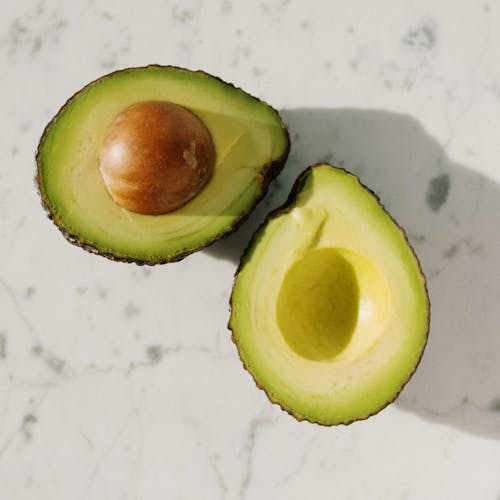This website uses cookies to enhance the user experience. By using Yoppie you are agreeing to our use of cookies.
What vitamins and minerals help with PMS? Here are our top 3…
Written by Yoppie
05 Jul 2022
What are the most common PMS symptoms?
1. Vitamin B6
2. Calcium
3. Magnesium
It’s no secret we all need vitamins and minerals. Whether you get enough from food or you supplement with daily tablets, getting enough of those essential Vs and Ms can make all the difference to your physical and mental health, energy levels, and overall wellbeing. Some have been found to be extra useful during *that* time in your menstrual cycle, so let’s take a look at what they are, and how you can make sure you’re getting enough. But first…
What are the most common PMS symptoms?
Studies have found 90% of people with periods experience PMS symptoms, and 5-8% of them get more severe symptoms that impact daily life. The most common symptoms include breast tenderness, cramps, bloating, headaches, mood swings, depression, anxiety, fatigue, acne, and food cravings. So… what vitamins and minerals can help?!
1. Vitamin B6
This vitamin really doesn’t get the recognition it deserves, as it can have significant positive effects on your whole body. It’s found in many foods, most notably fish like tuna and salmon, potatoes and starchy vegetables, organ meats like liver, fortified cereals, and chickpeas… bring on the hummus!
This one is particularly handy for the emotional and psychological symptoms of PMS, as it’s responsible for the neurotransmitters that affect mood. Several studies have found taking daily B6 supplements could help reduce symptoms like mood swings, irritability and anxiety, but more research is needed to determine how to use this superpower supplement to our advantage during our cycles.
Upping your intake could still offer benefits, especially since the body doesn’t store this vitamin. If you need to do this with a supplement, opt for around 50-100mg per day as recommended by experts - but not if you use cycloserine, anti-seizure medications or theophylline, because mixing these is a no-no, according to doctors.
Looking for an easy way to up your vitamin B6 levels? Our PMS-busting Hormone Hero and Mood Food supplements both contain B6 alongside other carefully chosen vitamins to help with your individual symptoms.
2. Calcium
Calcium has been widely associated with drinking milk and strong bones, but it’s now clear milk isn’t the only source, and strong bones aren’t the only benefit. Turns out calcium can be found in foods like seeds, yoghurt, beans, lentils and more, and has benefits for the body like muscle movement, cardiovascular function and… helping ease PMS symptoms - jackpot!
One study involving people with periods taking calcium carbonate supplements for 3 months resulted in patients experiencing less fatigue, food cravings and depression symptoms. A 2017 clinical trial also found calcium could help with symptoms like bloating and fatigue, and could even be effective in reducing psychological symptoms like mood swings and anxiety.
Want to see if adding a calcium supplement to your daily routine will help? Speak to your GP about the best dosage for you, or if you’re starting with over-the-counter supplements, keep in mind some experts recommend consuming around 1,200mg a day in food or supplement form, depending on age and sex. Exceeding the recommended daily amount can cause negative side effects like constipation, so if you have health concerns or are on medications like thyroid hormones or antibiotics, your GP may suggest a dosage at a certain time of day, so always run the plan past the doc first!
3. Magnesium
We’ve all become more curious about the potential benefits of magnesium over the last few years, with research shining a light on its links to our cycles and PMS symptoms. You can get magnesium by eating foods like almonds, peanuts and green leafy veggies, and it’s known for its involvement with dopamine in the brain. This is key because a dopamine imbalance can affect mood and cause anxiety according to studies.
Those who suffer with PMS symptoms have been found to have lower magnesium levels during the luteal phase of their cycle, and one 2010 study found taking magnesium supplements (alongside B6) helped ease symptoms like anxiety, sleep issues, bloating, and breast tenderness. Other studies have found varying results when it comes to magnesium, but it’s clear a connection to PMS is worth exploring.
The average daily recommendation is 300-400 mg depending on age and sex, but you can start with 200-250mg of magnesium a day to see benefits. As always, check with your GP before you begin as some medications don’t mix well. Too much magnesium can cause side effects like diarrhoea, so do your research before you start taking any supplement.
Want to boost your magnesium and ease PMS pains? Our Super Soother supplements are specially created to help soothe cramps, breast tenderness and headaches.
Our website has a short Learn Your Phase questionnaire that tells you where you’re at in your cycle, helping you decide which vitamins and minerals are best for you right now. We love to help people tackle the symptoms associated with the entire cycle - not just the bleed days - so whatever your symptoms or cycle goals are, we’ve got you.
Do you have a question about PMS vitamins or our supplements? Get in touch via our Full Stop FB group, or reach out to the team on IG at @itsyoppie so we can help.
Don't forget our personalised menstrual cycle subscription box can get organic tampons, PMS supplements and much more delivered easily and regularly through your letterbox, to give you just a bit more peace of mind each cycle.
Section jump
Back to top
Subscribe To Our Newsletter
YOPPIE





© 2026 Yoppie is a registered trademark of Phlo Technologies Ltd.
Yoppie's supplements are not a substitute for a varied diet and healthy lifestyle and are not intended to diagnose, treat, or cure any disease. If you are pregnant, breastfeeding, have a medical condition or are under medical supervision, please consult with your doctor before taking any of our products.






